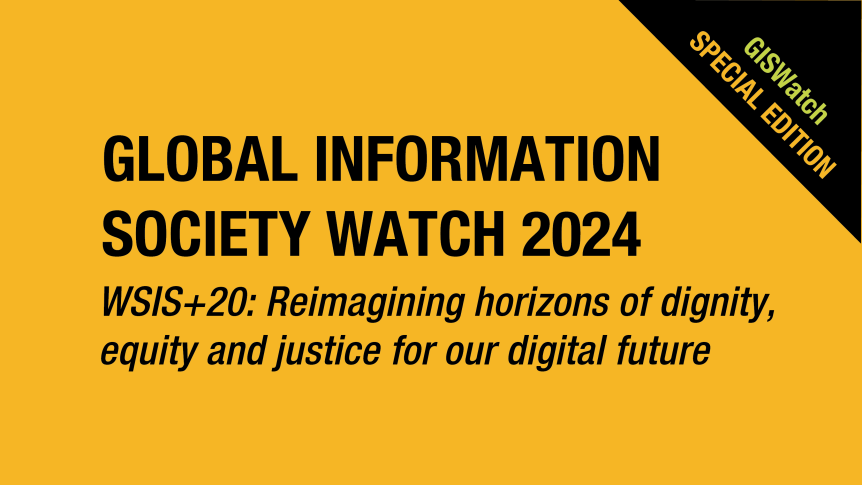
Twenty years ago, stakeholders gathered in Geneva at the first World Summit on the Information Society (WSIS) and affirmed a “common desire and commitment to build a people-centred, inclusive and development-oriented Information Society.” This is considered a “first-ever, clear statement of political will on establishing digitally-connected societies for the benefit of all and harnessing information communication technologies (ICTs) to support development objectives.” Since the framework for cooperation was set out in the Geneva Plan of Action (2003), much has changed in the global digital context, while many recognised challenges still remain.
In 2003, the Association for Progressive Communications (APC) together with the Campaign for Communication Rights in the Information Society (CRIS) published Involving civil society in ICT policy: The World Summit on the Information Society. The publication was designed to build awareness among civil society organisations of the nascent WSIS process, and their capacity to engage in WSIS.
This was followed by a GISWatch special report in 2013 called Communication rights ten years after the World Summit on the Information Society (WSIS): Civil society perceptions, in response to the WSIS+10 review. The report, which was the result of a survey and interviews, discussed a number of areas such as freedom of expression and public debate, access to technology and cultural rights in communication, as well as the fragmentation of the communications rights movement.
This current special edition, published at the time of the WSIS+20 review process, is driven by at least three framing questions:
- What should the role of WSIS be in the future in the midst of other processes shaping the digital terrain and its governance?
- What are its key and unique strengths?
- How can civil society – as well as governments – best respond to the changed context in order to crystallise the WSIS vision?
While the reports published here may not answer these questions directly, in different ways they inform further consideration of the questions by civil society organisations and governments.
In its interaction with other key ongoing processes, such as the Pact for the Future and the Global Digital Compact (GDC), and the need to build synergies among these processes, WSIS+20 is an opportunity to contribute to and reinterpret the WSIS vision. This needs to respond to the fact that internet governance and digital cooperation are interlinked, and that both need to take into account the realities of the constantly changing digital societies that we live in today. Moreover, as the Internet Governance Forum (IGF) mandate beyond 2025 will be considered by the review, WSIS+20, like the GDC, is key to strengthening and expanding the mandate of the IGF. The IGF remains at the heart of the internet governance and global digital cooperation ecosystems – there is no equivalent space for enabling public participation and shared learning on the positive and negative impacts of the internet and internet policies in a multidisciplinary and multistakeholder way.
As it stands, there is a danger that the architecture of digital governance emerging, fragmented as it is, is likely to reinforce the structural inequalities that are being amplified by digitalisation, rather than recognising these inequalities and their causes as unjust, and collectively committing to address these.
Ultimately, WSIS+20 needs to reflect the type of digital future we want and identify what we need to do to build this future. It could be a unique opportunity to place global digital cooperation – working towards both global and contextual responses – at the top of political agendas to address the persistent and emerging challenges in the digital age, including the environmental crisis. It could be used to ensure that the lessons learned from years of multistakeholder engagement feed into future governance processes and set the parameters for safeguarding inclusive dialogue, transparency and accountability. It could also renew and strengthen the mandate of the IGF and bridge the gaps between deliberative spaces and decision-making processes. As many of these reports suggest, the extent to which this will happen remains to be seen.
The introduction is based on the concept note developed for this special edition of GISWatch. The concept note was compiled through invaluable input from several people, including Anita Gurumurthy, Anriette Esterhuysen and David Souter, as well as a number of APC staff members. In some instances, contributors allowed us to use their input and comments verbatim, and this is gratefully acknowledged here.
Continue reading on GISWatch.org
We will be announcing more news about the upcoming launch of the GISWatch 2024 Special Edition ahead of the WSIS+20 Forum High-Level Event at the end of May. Stay tuned!
For more information, subscribe to the APC newsletter, join the conversation on social media, and visit GISWatch online.
These report were originally published as part of a larger compilation: “Global Information Society Watch 2024 Special edition: WSIS+20: Reimagining horizons of dignity, equity and justice for our digital future"
Creative Commons Attribution 4.0 International (CC BY 4.0) - Some rights reserved.
Web and e-book
ISBN: 978-92-95113-67-1
APC-202404-APC-R-EN-DIGITAL-357
Print
ISBN:978-92-95113-68-8
APC-202404-APC-R-EN-P-358